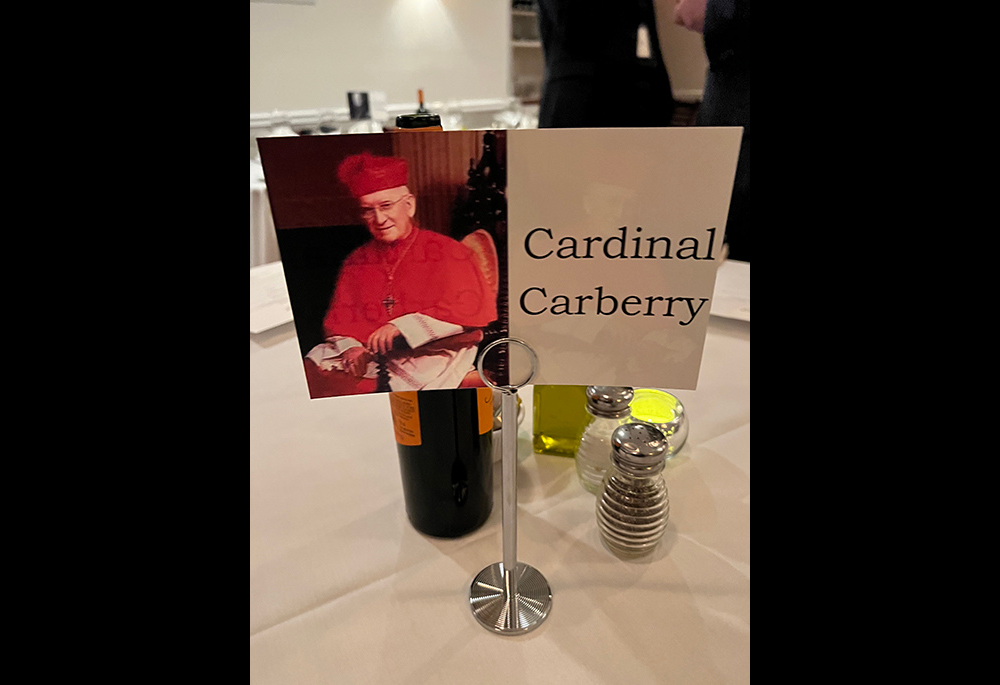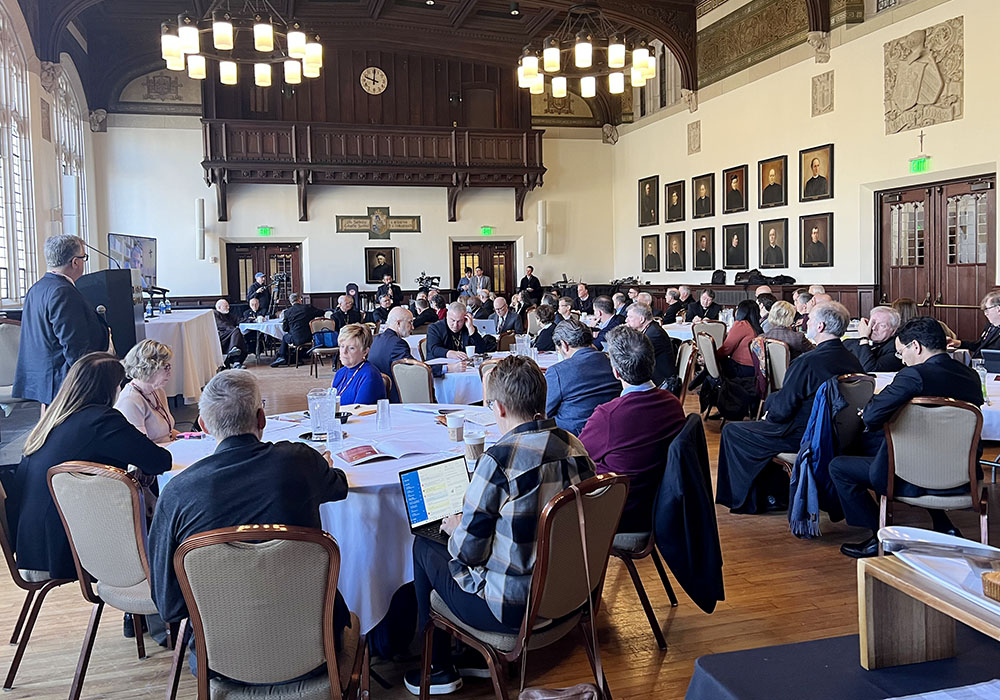
A table number featuring the late Cardinal John Carberry is pictured. Tables were named for cardinals during a group dinner that was part of a two-day ecclesial gathering March 3-4 at Boston College. (NCR photo/Brian Fraga)
"I'll start with red wine, thank you."
"How is the duck?"
"It is a little noisy in here."
"Is there any Splenda for the coffee?"
"Don't forget your scarf."
None of these statements focus on synodality per se. But they were among the comments I heard over the course of a two-day ecclesial gathering last weekend at Boston College. Arguably, it is the time spent at coffee breaks and over meals that was the most fertile at this conference, as it was last year when the first iteration of this gathering of bishops, theologians and other church leaders was held at Loyola University of Chicago.
At both last year's and last weekend's gatherings, there were different sets of conversations going on. At the cocktail hour before the welcoming dinner, all the bishops were speaking with one another and all the theologians were gathered into their own groups. It was important to let that happen, but then, at dinner, we assigned everyone to a table that combined bishops, theologians and other church leaders so that conversations between the groups could emerge.
This year's conference, titled, "The Way Forward: Pope Francis, Vatican II, and Synodality," focused on the pope's call to synodality from theological, historical and pastoral perspectives. There were ample, formal discussions of the challenges that need to be overcome in answering that call. The keynote addresses will soon be posted at the websites of the three academic centers that jointly sponsored the event: BC's Boisi Center, Fordham's Center on Religion and Culture and the Hank Center at Loyola Chicago. Several avenues for follow-up discussions manifested themselves over the course of the sessions. I was one of the organizers of the conference as well.
What always impresses me most, however, is the social and ecclesial dynamic that emerges. In the post-conciliar church, bishops and theologians have not often gotten together in a social setting, at least not in the United States. Several efforts have been made to launch such dialogues, but they only seem to succeed when organized by and for conservative Catholics, such as meetings of the National Catholic Bioethics Center and the Napa Institute. Our gatherings are intentional in welcoming a diverse group of bishops and theologians.
Advertisement
This time it seems to be working, and I think a key has been the introduction of other church leaders, including journalists. When you go to the U.S. bishops' meetings every year for 15 years, you get to know the bishops as persons, not just as bishops. You come to recognize that if you approach them with a chip on your shoulder, the conversation will not become vital and enlightening but scripted and predictable. You discern the differences amongst them so that it is hard to lump them together as "the bishops," often said with a sneer.
Similarly, Catholic leaders like Mercy Sr. Mary Haddad of the Catholic Health Association and Sean Callahan of Catholic Relief Services interact with bishops routinely. Catholic philanthropists also collaborate with bishops in ways theologians have not done. Such people not only have interesting perspectives on ecclesial issues, more importantly, they serve as the glue at dinner tables and in the coffee line, introducing people to one another, recalling a previous time spent together. In short, they make it possible to "walk together" in synod-speak.
Put differently, this year's event did not only discuss synodality. It displayed it. This is a large claim, larger than it might seem at first glance. For synodality to work, it is not enough to throw people in a room together and ask them to discuss their faith life. Synodality, indeed any and every ecclesial structure or system or movement, requires that we experience each other as persons. Theological anthropology — our understanding of the human person as created in the image and likeness of God, and called to conform ourselves to the forms of Jesus, the incarnate word — can only really advance if we treat each other as so created and so called, if we see each other as persons worth spending time with and engaging in conversation. That is easier to do when you are first breaking bread than if you are engaging in ideas.
Which is not to say that ideas are not important to the success of a gathering such as this. Last weekend (March 3-4), at Boston College, the idea that most clearly emerged was the need to center pastoral theology in our approach to synodality and much else. All the keynotes were highly intelligent, but associate professor Hosffman Ospino's talk "Practical and Pastoral Theology," which kicked off Day 2, lit up the room, assistant professor Susan Reynolds' response kept it going and Bishop Daniel Flores brought the house down with a talk on "Collegiality, Synodality, and the Pastoral Vision of Pope Francis." I love dogmatic studies as much as the next person, but rising interest in pastoral theology and the insights it yields may be one of the more enduring legacies of this pontificate.

Dozens of theologians and U.S. bishops attend the conference "The Way Forward: Pope Francis, Vatican II, and Synodality," held March 3-4 at Boston College. (Courtesy of Boisi Center for Religion and American Public Life)
The combination of time spent socializing with time for prayer together, and serious intellectual and pastoral discussions, is what has transformed these two events into an ecclesial gathering rather than the typical academic conference. And kudos to the musicians, Richard Clark, Ryan Lynch and Barbara Hill, who provided such amazing music at the two Masses! Nothing tops Mozart's "Laudate Dominum" at Communion time!
Both years, everyone who participated had a better chance at wrapping their head around the issues facing the church and some practical ideas about moving forward when they left for the airport. The bishops also developed new relationships that can sustain them in their often thankless task of governing a diocese. Theologians felt like their work could actually serve the church and its culture, not just the university and its culture. Journalists and other church leaders became essential connective tissue, socially and intellectually.
The Catholic Church in this country needs more such events that break through the silos that afflict our culture and our church. They will not bring on the eschaton, but they do help this wonderful, crazy, cumbersome institution we all love, the church, find a way forward, discern some lights in the mist, and build some friendships amidst all the alienation and polarization of the times. And the duck at the La Voile restaurant in Brookline was delicious!








